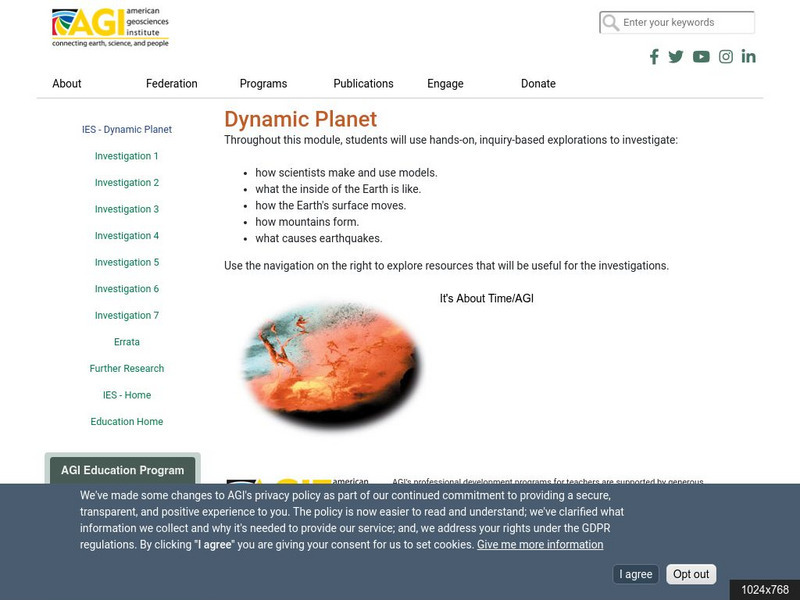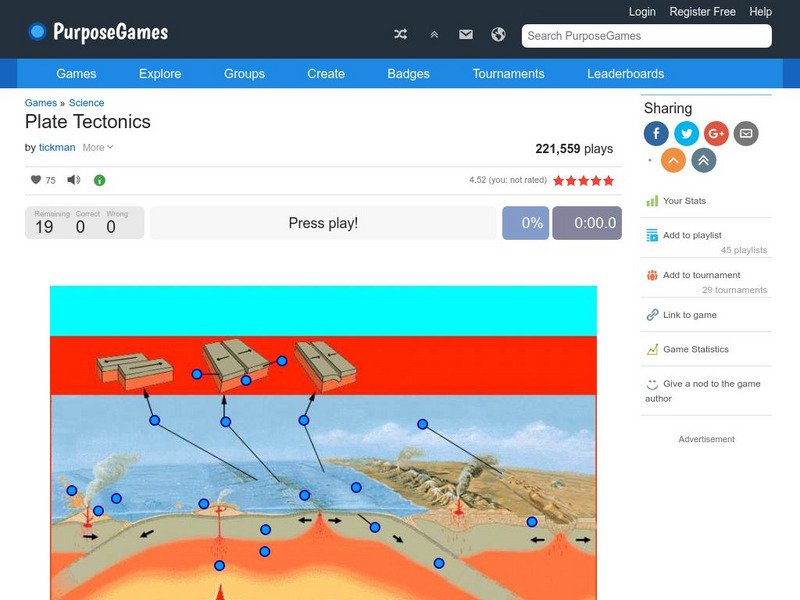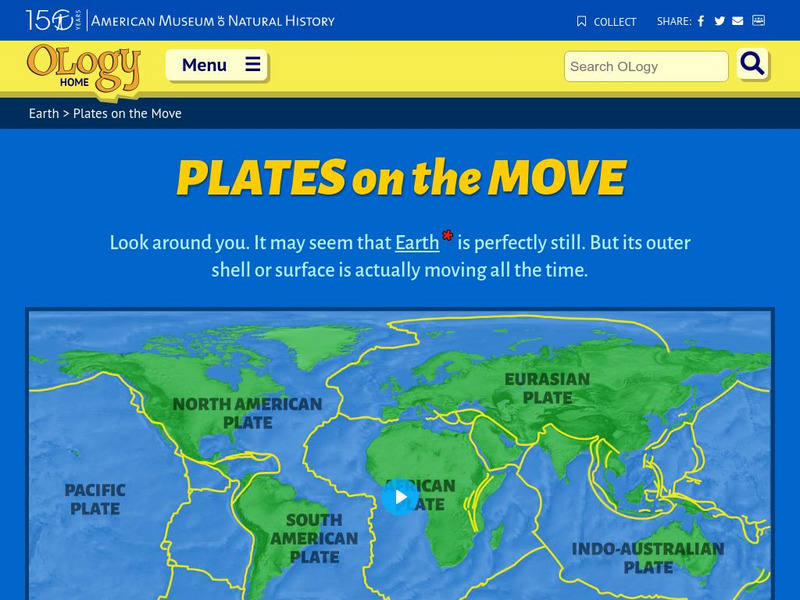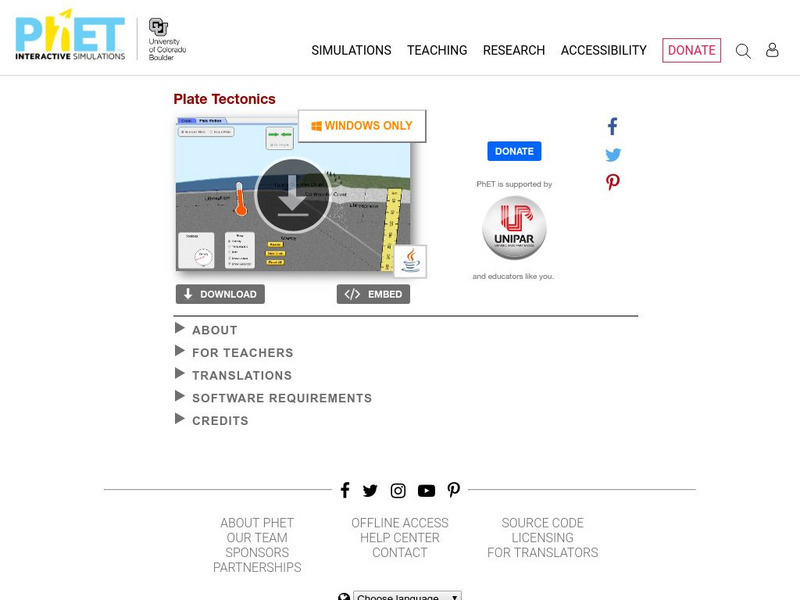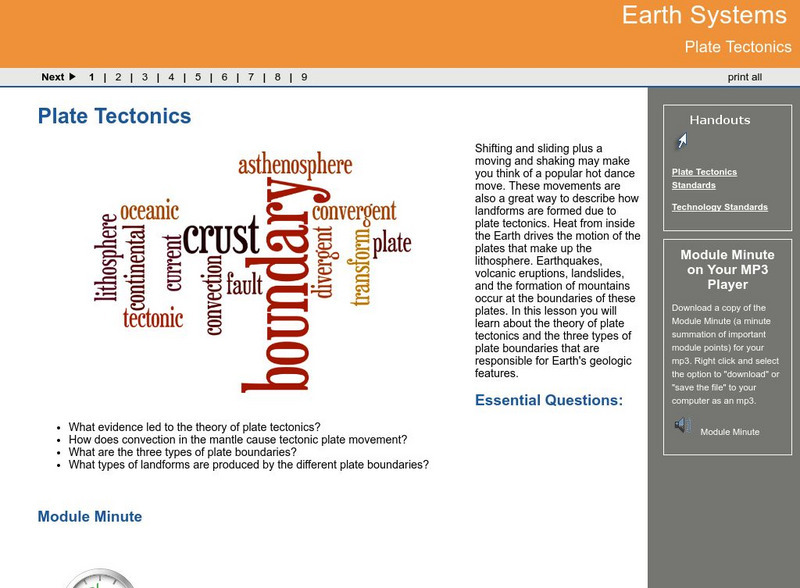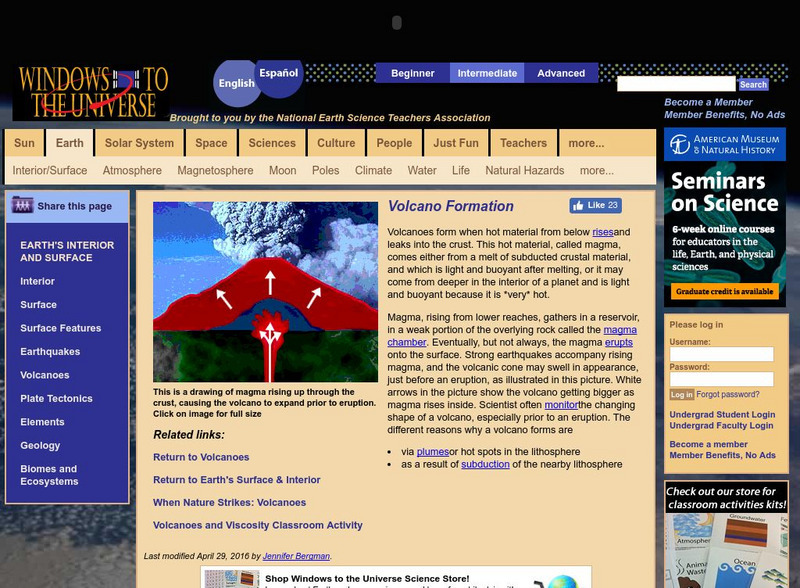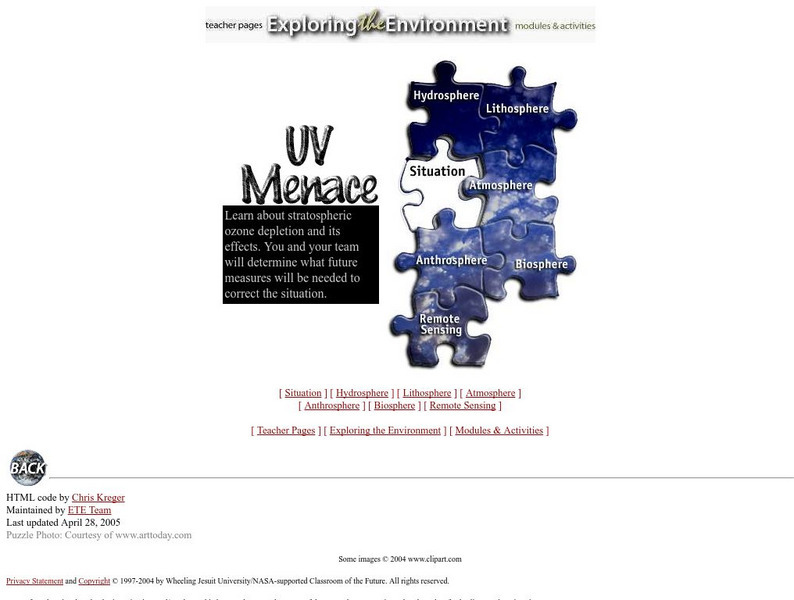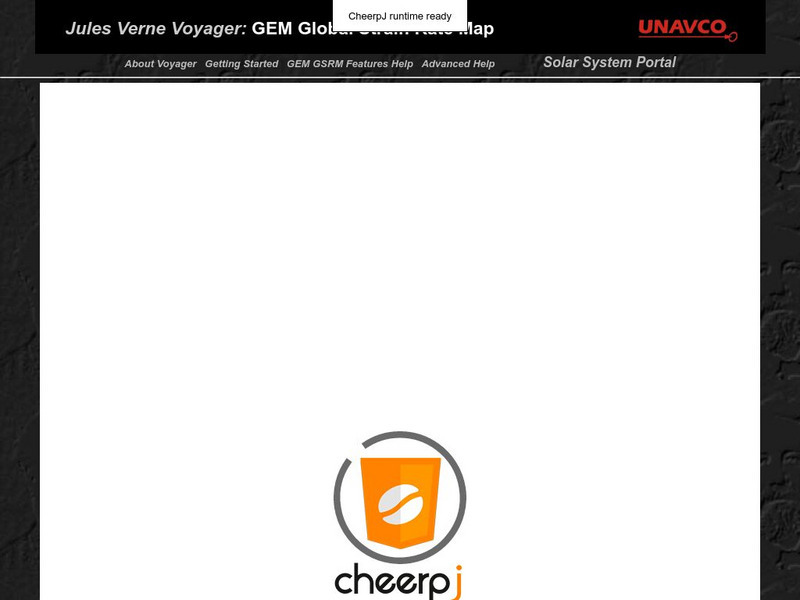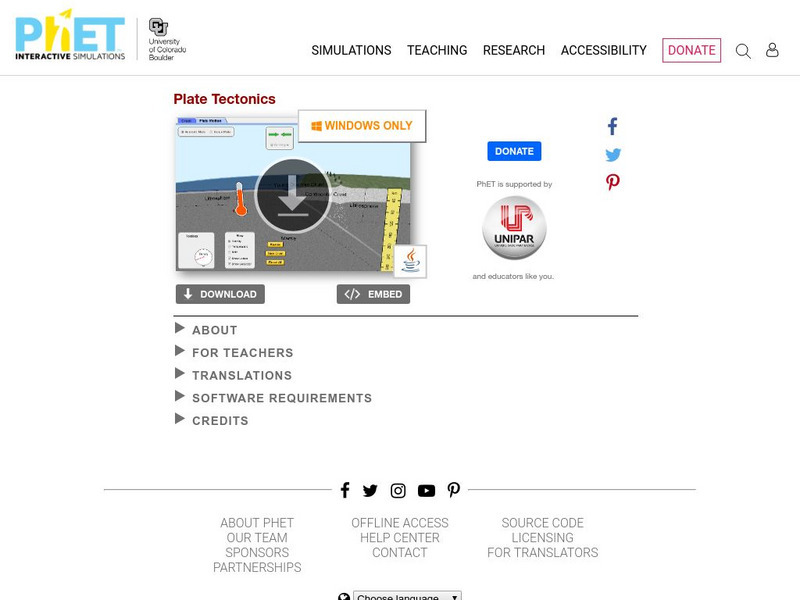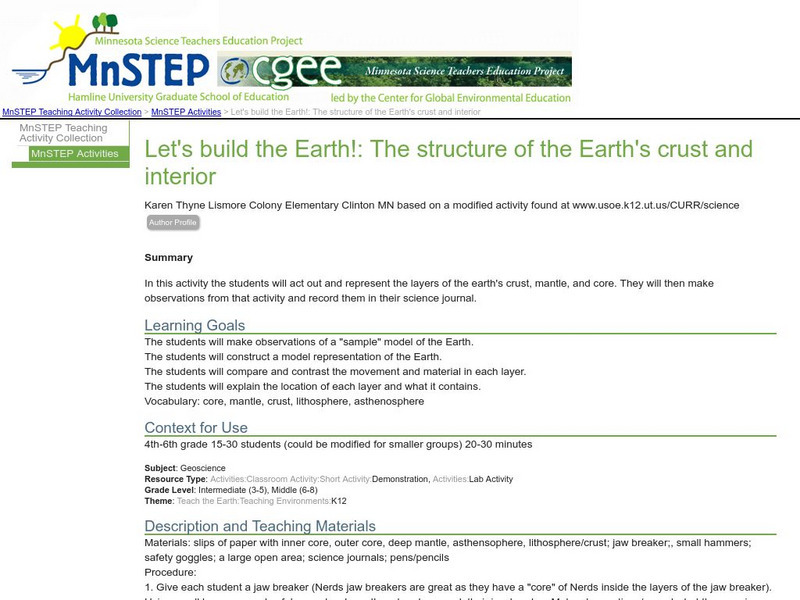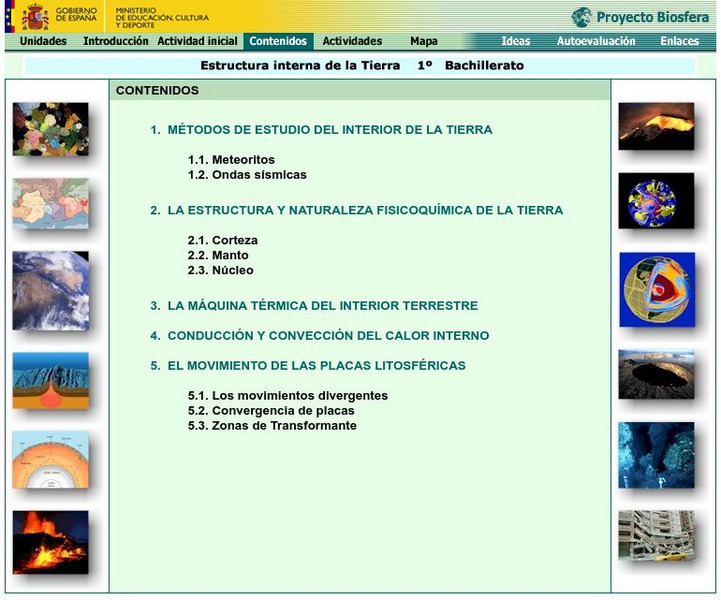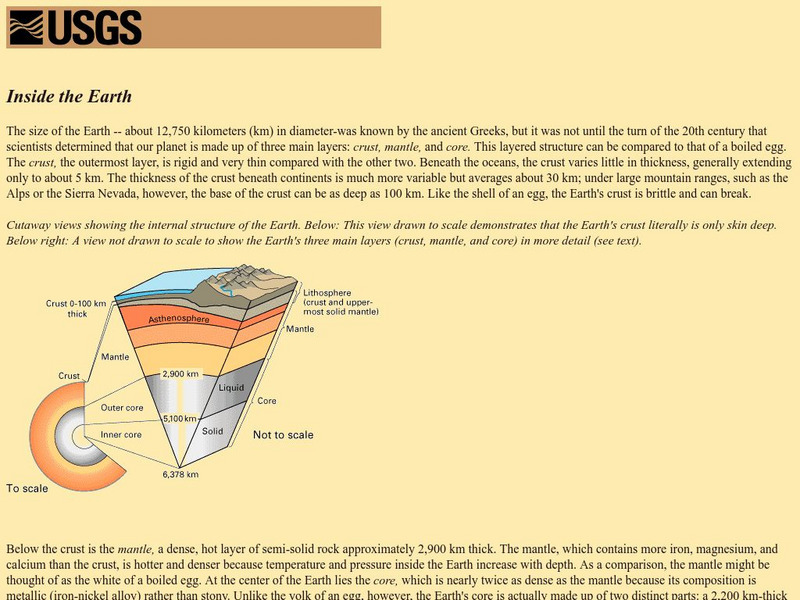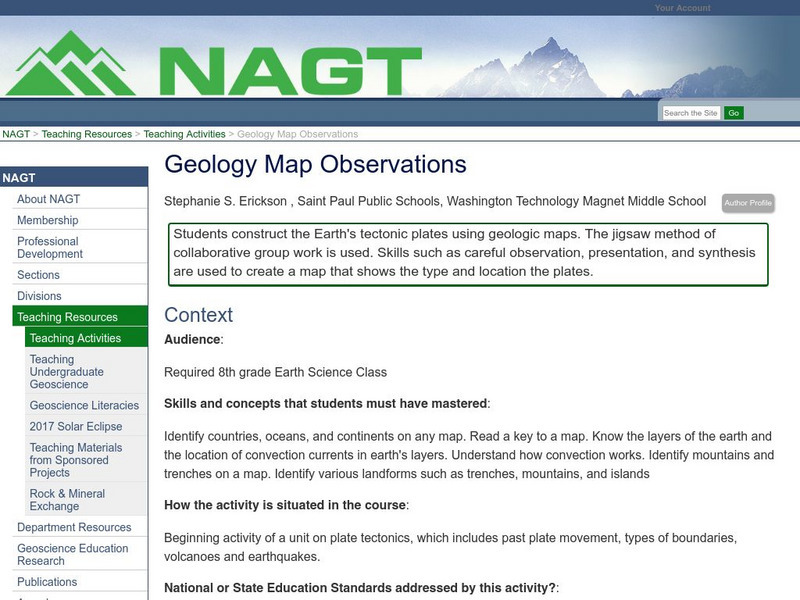Hi, what do you want to do?
Scholastic
Scholastic: Study Jams! Science: Lithosphere, Hydrosphere, and Atmosphere
A slideshow and a short multiple-choice quiz on the rock surface of the Earth, its water, and the gas layers that surround it.
American Geosciences Institute
American Geosciences Institute: Dynamic Planet
Seven hands-on lessons module where students learn about our dynamic planet. These inquiry-based explorations investigate scientific models, earthquakes and seismic waves, Earth's interior, Earth movements, the lithosphere, plate...
PurposeGames
Purpose Games: Plate Tectonics
Gamers will test their knowledge of plate tectonics with this interactive. Know your divergent plate boundaries, hot spots, trenches, lithosphere, and other trivial facts of plate tectonics.
NASA
Nasa: Earth: Overview: Our Home Planet
Provides a comprehensive look at the planet Earth including photos, how Earth got its name, and facts and figures about its size, seasons, moon, atmosphere, rotation, and lithosphere.
Oregon State University
Osu: Volcano World: Layers of the Earth
This is a website not only on the mantle but also about all the layers of the earth.
American Museum of Natural History
American Museum of Natural History: O Logy: Plates on the Move
Find an interrelated set of tools--maps, animations, diagrams, photographs, and text--to help you understand tectonic plates and how they move.
University of Colorado
University of Colorado: Ph Et Interactive Simulations: Plate Tectonics
Windows only - Interact with the tectonic plates of the Earth and see how changing variables affects the plates.
Georgia Department of Education
Ga Virtual Learning: Plate Tectonics
In this interactive lesson you will learn about the theory of plate tectonics and the three types of plate boundaries that are responsible for Earth's geologic features.
TeachEngineering
Teach Engineering: How Mountains Are Formed
Young scholars investigate how mountains are formed. Concepts include the composition and structure of the Earth's tectonic plates and tectonic plate boundaries, with an emphasis on plate convergence as it relates to mountain formation....
National Earth Science Teachers Association
Windows to the Universe: Volcano Formation
Explanation of the factors that result in the formation of volcanoes, some basic but helpful animations and photographs.
University of Colorado
University of Colorado: Ph Et Interactive Simulations: Plate Tectonics
Explore how plates move on the surface of the earth. Change temperature, composition, and thickness of plates. Discover how to create new mountains, volcanoes, or oceans! Java is required.
Other
University of Texas Arlington: Isostasy, Gravity, Magnetism, and Internal Heat
An in-depth look at how isostasy works and the processes taking place during glaciation and the melting of glaciers. Looks at gravity and the effects of density differences within the crust and mantle, and at Earth's magnetic field and...
TED Talks
Ted: Ted Ed: A Guide to the Energy of the Earth
Energy is neither created nor destroyed - and yet the global demand for it continues to increase. But where does energy come from, and where does it go? This video examines the many ways in which energy cycles through our planet, from...
Center for Educational Technologies
Nasa Classroom of the Future: Environment Module: Uv Menace
This site provides information and activities for classes to learn more about ozone depletion and UV radiation.
Other
Interactions Between the Atmosphere & Hydrosphere [Pdf]
A discussion of the interactions between the four spheres of Earth and how they affect weather and climate. The slideshow is divided into two parts. The first deals with interactions between the atmosphere and the hydrosphere and the...
Other
Jules Verne Voyager: Gem Global Strain Rate Map
GEM GSRM uses a texture underlay grid showing the 2nd invariant of lithospheric strain rate, with an image overlay of coastal outlines in white - which forces the texture underlay to have a black background in regions of zero strain...
National Institute of Educational Technologies and Teacher Training (Spain)
Ministerio De Educacion: Los Cambios en El Medio Natural I
In this unit you can learn about the internal structure of the Earth. It has 13 interactive activities.
University of Colorado
University of Colorado: Ph Et Interactive Simulations: Ph Et: Interactive Simulations: Plate Tectonics
Students studying plate tectonics will better understand its concepts with this virtual experiment that tests how plates move on the surface of the earth. Temperature, composition, and thickness of plates can be changed to create new...
Science Education Resource Center at Carleton College
Serc: Let's Build the Earth!: The Structure of the Earth's Crust and Interior
For this activity, learners will make observations then construct a "sample" model representation of the Earth's layers. They will compare and contrast the movement and material in each layer explaining the location and what it contains.
National Institute of Educational Technologies and Teacher Training (Spain)
Ministerio De Educacion: Los Cambios en El Medio Natural Ii
In this unit you can learn about the deformation of rocks, magmatism, plutonism and seismic waves. It has 16 interactive activities.
National Institute of Educational Technologies and Teacher Training (Spain)
Ministerio De Educacion: Estructura Interna De La Tierra
In addition to exploring the inside of the earth, this unit will explore the consequences on the dynamics of the outer layers; it will deepen the knowledge of plate tectonics and the movement of the plates in the past. It includes 16...
Other
Plate Tectonic Theory [Pdf]
Check out this slideshow on Plate Tectonics-The unifying theory for all other theories in the Earth sciences-Has resulted in a more detailed understanding of Earth history-Has enabled geologists to more precisely(and cheaply) discover...
US Geological Survey
Usgs: Inside the Earth
This is a website to learn not only about the inner and outer core, but also about the crust and the mantle of the interior of the earth.
National Association of Geoscience Teachers
Nagt: Geology Map Observations
In jigsaw groups, young scholars construct the Earth's tectonic plates using geologic maps. Skills such as careful observation, presentation, and synthesis are used to create a map that shows the type and location the plates.






